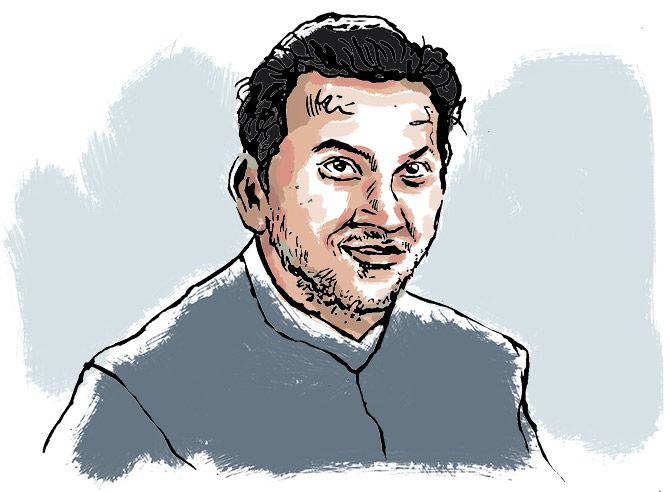The modus operandi of Oyo founder Ritesh Agarwal raising his stake in the company and the objective behind it has left the audience perplexed, reports Nivedita Mookerji.
Illustration: Dominic Xavier/Rediff.com.

A WhatsApp message flashed on the mobile screen a few days ago. Another financial scam waiting to explode, it said. By then, social media had begun talking about an impending bubble burst.
The chatter was prompted by Oyo Founder Ritesh Agarwal's unusual step of pledging his shares to borrow more than $2 billion to buy back more shares from some of the investors in the firm.
Let's be clear. There's no evidence, at this point, of any scam or bubble burst arising from the buy-back in the firm that aggregates hotel rooms in almost every nook and corner of the country as well as many other parts of the world.
It's the modus operandi of Agarwal raising his stake in the company and the objective behind it that has left the audience perplexed.
The buy-back routed through Cayman Islands-registered entity only adds an extra layer of mystery, making industry watchers sit up.
Recently, Agarwal had signed a deal to buy back shares worth nearly Rs 13,770 crore (over $2 billion) from early investors -- Lightspeed Venture Partners and Sequoia India -- through his Cayman islands-registered entity, RA Hospitality Holdings, to almost triple his stake in the company.
Lightspeed and Sequoia were selling part of their holdings to help the founder increase his stake while remaining invested significantly in the company's long-term mission, Oyo said in a statement.
Making things even more mysterious, Japanese financial groups Mizuho and Nomura Holdings reportedly financed Agarwal's share buy-back.
The loan has been given for three years against shares and the repayment has been timed with Oyo's proposed initial public offering (IPO).
Unravelling of the whys and hows of the buy-back could take time, perhaps a couple of years from now when Oyo goes for an IPO as planned. Or, maybe earlier.
However, Oyo has been wrapped in mystery since its early days. From starting as an Indian avatar of San Francisco-based Airbnb to evolving its own business model and from being celebrated as the largest hotel chain in the country with hardly any physical assets to reaching dizzy valuations in record time, Oyo's superfast rise has been a surprise and sometimes a cause of worry in the fragile startup universe. More so because the man behind it all is still years away from turning 30.
But the biggest mystery that Oyo was caught in for the longest time was related to acquisition of a similar budget hotel room aggregator called Zo Rooms.
Reports towards end of 2015 suggested that Tiger Global-backed Zo Rooms was acquired by SoftBank-funded Oyo in an all-stock deal.
Oyo kept things under wraps but later SoftBank, its lead investor, gave it away in an earnings call in 2016, opening a pandora's box.
Then the news was out that the deal had fallen after Oyo said it didn't see any value in the transaction. In the meantime, Zo Rooms had shut down.
Eventually, the case landed up in the courts with allegations of data theft, cheating and breach of trust levelled against each other.
While it seemed like an all-out war between the founders and top executives of the two start-ups, it was really the investors, mainly Tiger Global and SoftBank, who were the main protagonists in the Zo-Oyo goings on.
From the time the Oyo-Zo deal talk began, the valuation of Agarwal-headed business rose briskly -- from around $400 million in 2016 to an estimated $5 billion early 2019.
This time too it's all about investor play and valuation game, rather than an initiative taken by Agarwal, 26, to increase his stake in the business through buy-back of shares after pledging shares.
The latest estimated valuation of Oyo is $10 billion, doubling up from the previous count.
In an interview about three years ago to this newspaper, Agarwal had dismissed a question on his target date for becoming a unicorn (touch a $1 billion valuation).
This is what he had to say: "I have a long time before me. I don't have a timeline for that (becoming a unicorn) and I really don't care... What I can tell you is that we will execute our plans to be the largest and densest hotel brand of India by the end of this year.
"Valuation will go up if the markets are good..."
This may be a good time for him to recall his own statement made three years ago, that he has a long time before him. There's no hurry.












 © 2025
© 2025